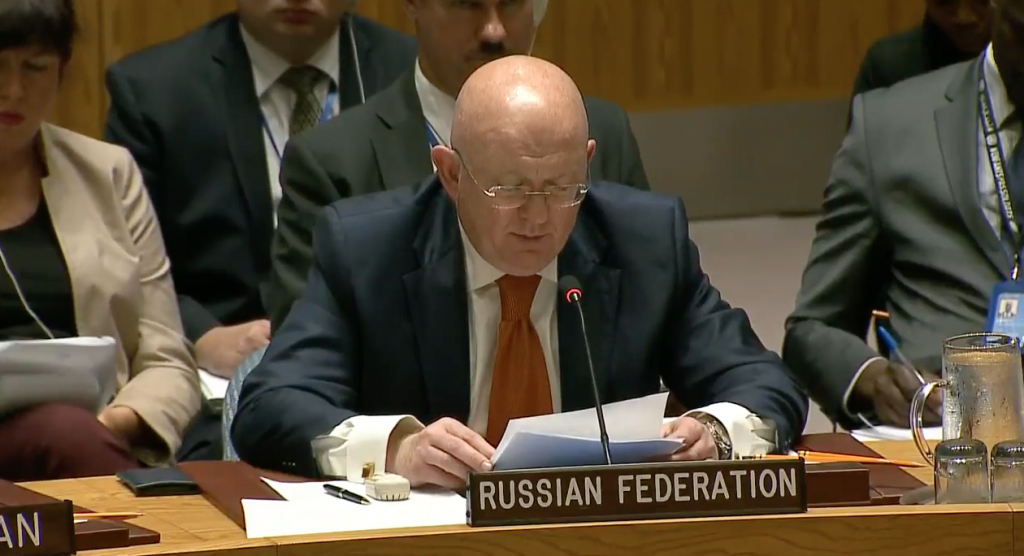Statement by Ambassador Vassily A. Nebenzia, Permanent Representative of the Russian Federation to the United Nations, during the UN Security Council meeting on peace and security in Africa
We are grateful to Deputy Secretary-General Amina Mohammed and Permanent Observer of the African Union, Mr. Téte António, for their useful and detailed briefings. We would also like to commend the Executive Director of UN-Women, Ms. Phumzile Mlambo-Ngcuka, and the Special Representative of the Secretary-General on Sexual Violence in Conflict, Pramila Patten.
Preventing and resolving conflicts is a necessary precondition for ensuring stability and sustainable development and for promoting and protecting human rights.
We support the work of the African Union and subregional bodies in their roles regarding conflict prevention and resolution, since it is precisely those organizations that have the best information concerning the situation on the ground and the possibilities for peaceful settlement. We also favour strengthening cooperation between the United Nations and the African Union.
The issue of women and peace and security is an integral part of the overall peace process and postconflict peacebuilding. The African Union five-year Gender, Peace and Security Programme 2015-2020 is a clear example of a regional initiative to bolster women’s participation in peace processes. It is also important to ensure that such work is not merely declamatory but leads to specific results in connection with improving women and girls’ status in conflict and post-conflict societies.
We are concerned about ongoing reports of sexual violence perpetrated by terrorist groups, such as the Islamic State in Iraq and the Sham and Boko Haram. We categorically condemn that criminal practice used by terrorists. We urge States to cooperate actively in combating the shadow economy of terrorists who benefit financially from human trafficking, sexual slavery and forced prostitution. We support the work of the multinational armed forces comprised of African troops to combat Boko Haram.
We concur with our colleagues’ concerns that the deteriorating situation in the Congolese provinces of Kasai is harming women and children. We are concerned about the escalating confrontation between the authorities and tribal armed militias in those provinces. The Government and the United Nations Organization Stabilization Mission in the Democratic Republic of the Congo need to take additional measures to diffuse the situation.
We would, however, like to warn against indiscriminately blaming what is happening on the Congolese troops and police for their allegedly disproportionate use of force. Members of the Kamwina Nsapu militia are also to blame. They are attacking Government officials, schools and polling stations and recruiting child soldiers.
That cannot justify human rights violations by law enforcement agencies. We nonetheless need to wait for the outcome of the official investigation by the authorities.
We believe that the root causes of that problem should be addressed by assisting the Congolese authorities to reform their security sector so as to ensure that law enforcement agents uphold human rights. The implementation of the human rights due diligence policy needs to be carried out more cautiously, as it does not allow for the building of the capacity of law enforcement agencies, but as a consequence the military and political situation is failing to improve and there seems to be a vicious cycle.
We believe that in order to improve stability in the Democratic Republic of the Congo, the comprehensive political agreement of 31 December 2016 needs to be upheld by all Congolese parties.
The protection of women in armed conflict from the threat of sexual violence is the primary task of the Governments of States involved in conflicts. We would therefore like to particularly highlight the measures taken by the Government of Nigeria and the Democratic Republic of the Congo to combat gender and sexual violence in armed conflict, including combating impunity for that type of crime, deploying female police officers in camps for internally displaced persons and refugee camps, providing medical, psychological and legal assistance to the survivors of such violence and helping them in social and economic reintegration.
We believe that the international community, including the United Nations, faces a significant challenge in helping build national capacity related to combating and preventing violence against women and girls in armed conflict and in assisting national efforts to improve women’s participation in conflict prevention and resolution.
